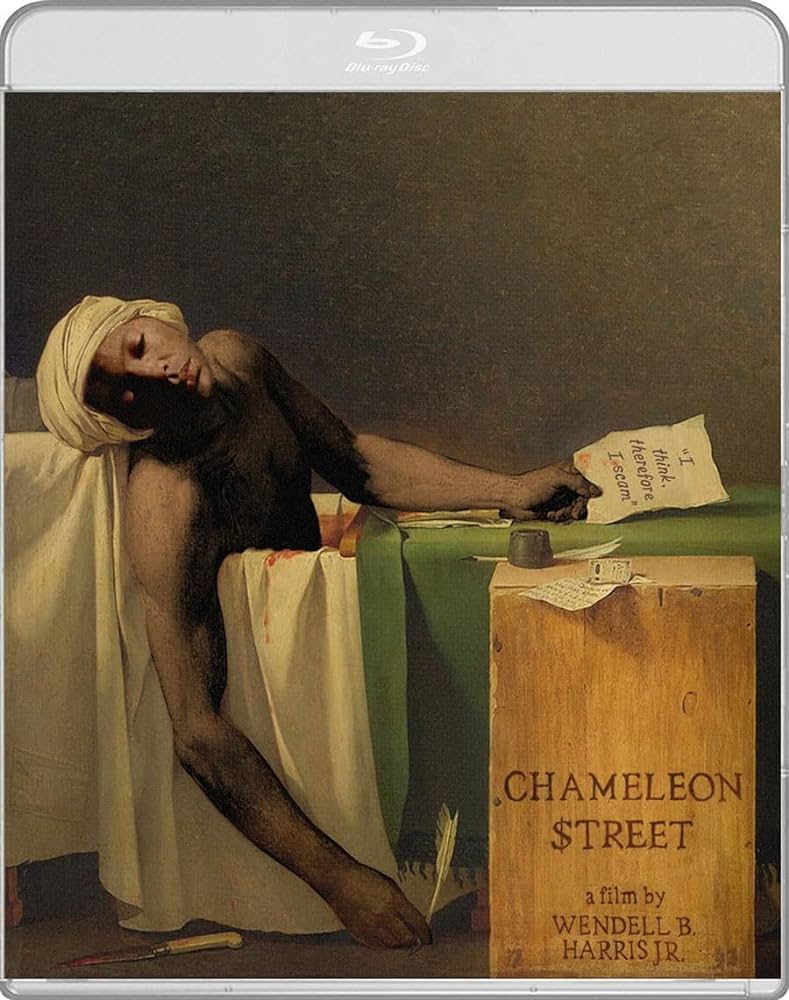Based on the true story of multi-faceted con man William Douglas Street, Jr., Chameleon Street, winner of the Grand Jury Prize at Sundance in 1990, comes to blu-ray courtesy of the fine folks at Arbelos, purveyors of other little seen masterpieces of indie cinema such as Toshio Matsumoto’s Funeral Parade of Roses and Béla Tarr’s Sátántangó. And as usual, Arbelos does a bang up job on the presentation.
William Douglas Street, Jr. is a complex man who has perpetrated some of the most delirious con job copycat crimes in history, impersonating to various degrees of success an Ivy league student, magazine reporter, lawyer and even surgeon, performing 36 hysterectomies in the process! Street, both in real life and as portrayed in the film, is a man of very high intelligence but low on formal education. He truly earned the nickname of “Chameleon” by not only pretending to be someone he wasn’t but pulling it off consistently in a wide variety of different professions. Street even posed as Jerry Levias, a football player for the Houston Oilers, meeting with the Detroit Tigers claiming that he, Levias, was ready to retire from football and try his hand at baseball. He even went so far as to train with the Tigers before being found out. Astonishing stuff. The film focuses not only on these outrageous exploits but also on Street’s home life and how his erratic schemes affected his personal relationships.
Chameleon Street really is an overlooked gem of a film due in large part to multi-disciplined filmmaker Wendell B. Harris, Jr. who acted as Street, wrote the script and directed it. This auteurist vision is apparent from the get-go. Chameleon Street is not a traditional biopic. It’s a kind of free-flowing tone poem, both witty and engaging in equal measure, weaving in and out of Street’s life like an improvisational jazz solo. Harris as Street clues us in to his mind’s inner workings and how he can pull these crazy feats of cinematic legerdemain off while also reflecting on the moments that brought him to where he was. According to an interview with Harris in the Extras, every word of Chameleon Street is based on Street’s own personal memoirs and hours of interviews that Harris conducted with Street. What this means is that we are getting Street’s version of his life and at times one gets the sense that audience is also being conned a little. What’s the difference between how Street actually feels and how he wants you to think he feels? In his eyes, there is probably no difference. Life is but a masquerade and Street merely wants to dance. If the film has any failings, it’s in the low budget, ramshackle nature of the production. Some of the editing feels a bit rough around the edges. Some of the actors are obviously non-professional. But honestly for me it just adds to the charm and authenticity of the picture.
Arbelos gives us a very good 4K transfer from the original 35mm negatives and while we get a healthy amount of grain, given the low budget indie nature of the film, that’s to be expected. Overall, this picture looks very nice indeed. The audio is a simple but clean 2.0 track that isn’t going to dazzle but delivers the extensive dialogue clearly and concisely.
Arbelos has really gone the extra mile to pack this disc with lots of extras. Included are two audio commentaries, one with Wendell B. Harris, Jr. and Sight & Sound film critic Ashley Clark and then another with some of the cast and crew. Both are full of information and while there is some overlap, both are worth checking out if you are a fan of the film. If you have to pick just one, Harris’ is probably the most thorough in behind-the-scenes information. If you don’t have time for a full audio commentary or want even more info about the film, there are two interviews with Wendell B. Harris, Jr., one 25 minutes and the other a shorter 6 minute one. Additionally we have a 25-minute making-of featurette called “The Process”, Harris’ early short film “Colette Vignette” featuring the actress from Chameleon Street, a neat featurette on the casting process of Chameleon Street called “So, You Say You Know Leadbelly…”, and a breakdown of a scene from the film called “Marriage Counseling. The disc also includes a printed booklet featuring an interview with Harris from IndieWire conducted by Tambay Oberson that focuses on both Harris’ and the film’s legacy after its release.
Arbelos has done a masterful job of putting out a nearly forgotten gem that is ripe for rediscovery. Chameleon Street is well-deserving of its place in cinema, and Arbelos is doing great work by bringing it to the masses.

